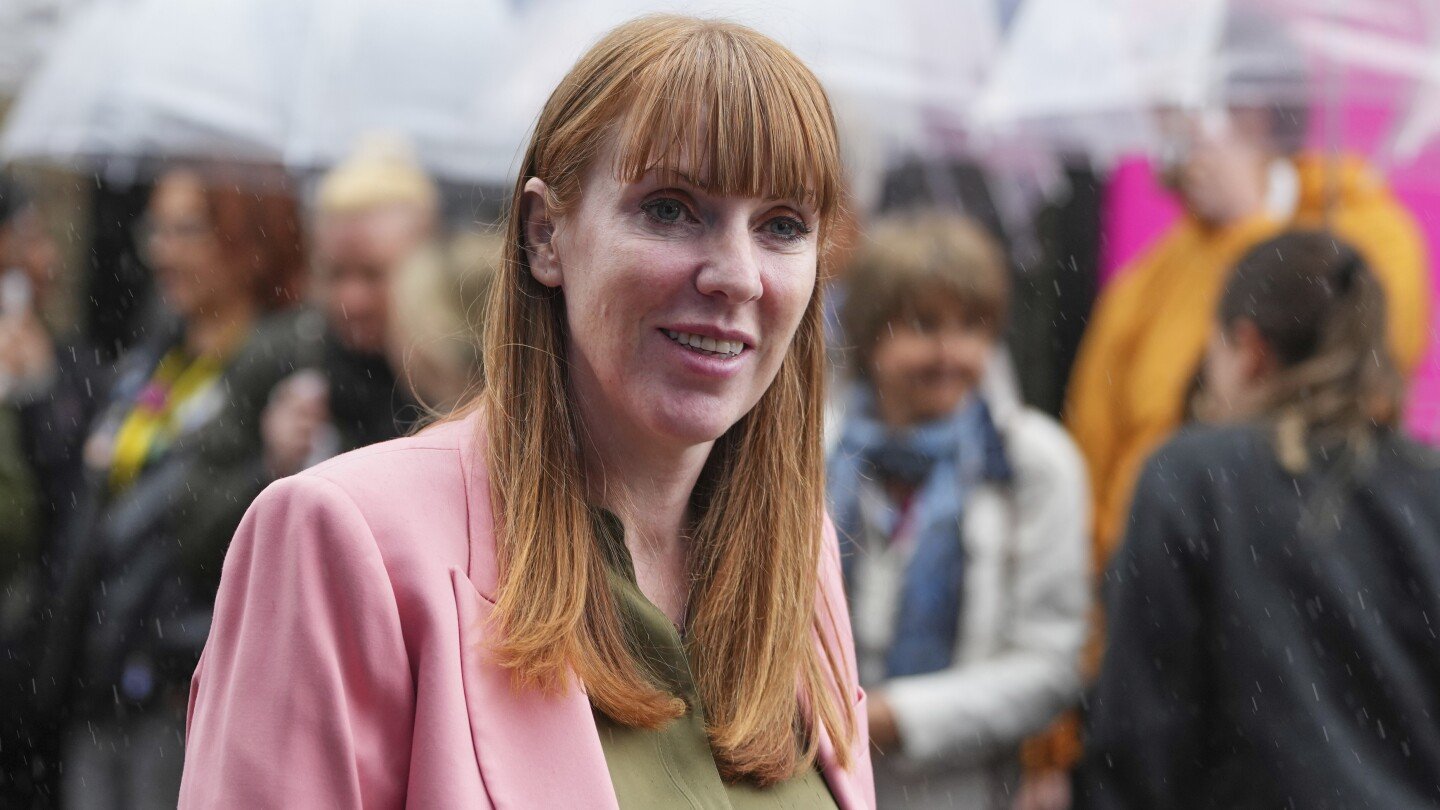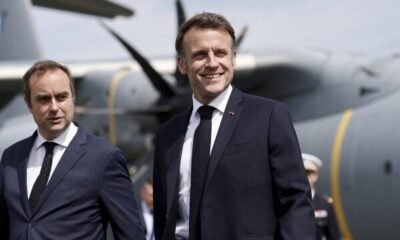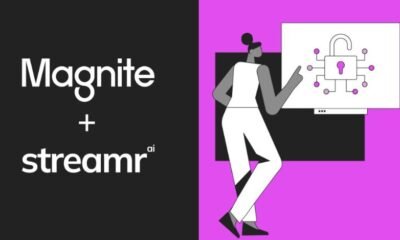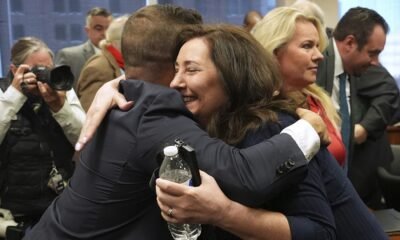Top Stories
UK deputy prime minister resigns over tax error

LONDON (AP) — U.K. deputy prime minister Angela Rayner resigned Friday after an independent inquiry found that she fell short of the standards expected of government ministers over a tax error on a recent house purchase.
Rayner, who acknowledged on Wednesday that she didn’t pay enough tax on her purchase of an apartment in Hove, on England’s south coast, conceded that she should have sought more specific advice, while stressing that the report found that she had acted in good faith.
“I take full responsibility for this error,” she said in her resignation letter to Prime Minister Keir Starmer. “I would like to take this opportunity to repeat that it was never my intention to do anything other than pay the right amount.”
In response, Starmer voiced his sadness, but said that Rayner had made the right decision to stand down.
AP AUDIO: UK deputy prime minister resigns over tax error
AP correspondent Charles de Ledesma reports senior British lawmaker Angela Rayner has resigned over failing to pay enough tax on a south England home.
“I have nothing but admiration for you and huge respect for your achievements in politics,” Starmer wrote. The handwritten letter signed off “with very best wishes and with real sadness.”
Rayner will remain a U.K. lawmaker on the back benches. She referred herself to the independent adviser on ministerial standards, Laurie Magnus, on Wednesday, who delivered his report to Starmer on Friday.
Though Magnus concluded that Rayner had “acted with integrity and with a dedicated and exemplary commitment to public service,“ he said that “with deep regret” she had breached the ministers’ code of conduct.
In the U.K., levies are charged on property purchases, with higher charges due on more expensive homes and secondary residences. Reports have suggested that Rayner saved 40,000 pounds (nearly $54,000) by not paying the appropriate levy, known as a stamp duty, on her 800,000-pound ($1 million) purchase.
Rayner, 45, had sought to explain that her “complex living arrangements” related to her divorce in 2023 and the fact that her son has “lifelong disabilities” underlay her failure to pay the appropriate tax.
In her resignation letter, Rayner said she also had to “consider the significant toll that the ongoing pressure of the media is taking on my family.”
Rayner’s journey from teenage single mother to trade union official to lawmaker and deputy prime minister is a rarity in British politics.
Her no-nonsense attitude and plain-speaking manner have been a distinct — and politically useful — contrast to the more pragmatic, lawyerly Starmer and she will be hard to replace. She had the ability to connect with sections of the public that Starmer had struggled with since he became prime minister.
Rayner, who held the housing brief in the Labour government, had often railed against those who deliberately underpay tax, particularly those in the preceding Conservative administration, which Labour replaced in July 2024.
Her previous comments had opened her up to charges of hypocrisy, particularly from current Conservative leader Kemi Badenoch, who said that Rayner’s position had been “untenable for days.”
“The truth is simple, she dodged tax,” Badenoch said in a video posted on social media. “She lied about it.”
Rayner is a hugely popular member of the Labour Party and was widely tipped to be a potential successor to Starmer. In addition to resigning as deputy prime minister, Rayner quit as deputy leader of the party, meaning that members will have to select someone new.
Starmer is undertaking a shuffle of his Cabinet following Rayner’s resignation. He will be hoping that the political agenda can now move on after days of speculation surrounding Rayner’s future.
His Labour government has seen its support fall sharply since it won last year’s election following a string of missteps, particularly on welfare reform, and ongoing concerns about immigration.
Top Stories
Trump calls on EU to impose 100% tariff on China and India to pressure Putin

US President Donald Trump has called on the European Union to hit China and India with tariffs of up to 100% as part of his efforts to force Russian President Vladimir Putin to end the war in Ukraine, a source familiar with the discussions has told the BBC.
He made the demand, first reported by the Financial Times, during a meeting between US and EU officials on Tuesday discussing options to increase economic pressure on Russia.
The proposal comes as Trump struggles to broker a peace deal between Moscow and Kyiv and as Russia’s strikes on Ukraine intensify.
Separately, Trump told reporters on Tuesday that he plans to talk to Putin on a call this week or early next week.
Ukraine’s main government building in Kyiv was struck by a Russian missile over the weekend – in an attack that was seen as both symbolic and a major increase of aggression by the Kremlin.
Over the weekend, attacks across the country marked the heaviest aerial bombardment on Ukraine since the war began. Ukraine said Russian forces used at least 810 drones and 13 missiles.
On Tuesday, more than 20 civilians were killed by a Russian glide bomb in the eastern Donbas region, as they queued to collect their pensions.
Speaking to reporters after the weekend bombardment, Trump said he was “not happy with the whole situation” and threatened harsher sanctions on the Kremlin.
The US president has previously threatened harsher measures against Russia, but not taken any action despite Putin ignoring his deadlines and threats of sanctions.
A highly anticipated summit between the leaders in Alaska last month ended without a peace deal.
Trump’s request to the European Union follows remarks from US Treasury Secretary Scott Bessent, who said Washington was prepared to escalate economic pressure but needed stronger European backing.
Trump also said on Tuesday that the US and India were “continuing negotiations to address the Trade Barriers” between the two countries.
He plans to speak to Indian Prime Minister Narendra Modi in the coming weeks and expects a “successful conclusion” to their trade talks, he wrote on his Truth Social platform.
In response to the post, Modi echoed Trump’s optimism that the talks would be successful and said the two countries were “close friends and natural partners.”
“Our teams are working to conclude these discussions at the earliest. I am also looking forward to speaking with President Trump,” he added.
Trump’s comments have been seen by some as the latest sign of a reconciliation between Washington and Delhi, after a collapse in their trade negotiations.
Last week, Trump emphasised the “special relationship” between India and the US, saying “there’s nothing to worry about. We just have moments on occasion”.
China and India are major buyers of Russian oil, which helps to keep the Russian economy afloat.
Last month, the US imposed a 50% tariff on goods from India, which included a 25% penalty for its transactions with Russia.
Although the EU has said it would end its dependency on Russian energy, around 19% of its natural gas imports still come from Russia.
If the EU does impose the tariffs on China and India it would mark a change to its approach of attempting to isolate Russia with sanctions rather than trade levies.
Top Stories
Horoscope for Wednesday, September 10, 2025 – Chicago Sun-Times

- Horoscope for Wednesday, September 10, 2025 Chicago Sun-Times
- Horoscopes Today, September 10, 2025 USA Today
- Your Daily Horoscope by Madame Clairevoyant: September 10, 2025 The Cut
- Horoscope for Wednesday, 9/10/25 by Christopher Renstrom SFGATE
- Your Daily Singles Horoscope for September 10, 2025 yahoo.com
Top Stories
Ford rolls out new ad campaign amid industry-wide uncertainty

Ford on Wednesday rolled out a new advertising campaign that the company said will mark a “fundamental shift” in its branding strategy — and comes as the auto industry deals with major uncertainty.
The automaker’s new strategy, titled “Ready, Set, Ford,” goes beyond vehicle-first advertising, Ford said, and instead focuses on the people who buy its cars. It involves four fundamental promises: capability, passion, community and trust.
The auto industry is facing a crucial crossroads as companies deal with President Donald Trump‘s tariffs and an overall consumer pullback in spending. Despite uncertainty with various sectoral tariffs, Trump’s auto tariffs have remained more or less unchanged, with a 25% tariff charge on imported cars and auto parts.
That timing, Ford Chief Marketing Officer Lisa Materazzo said, is intentional.
“The auto industry is in the midst of historic disruption. We are fortunate in the sense that Ford has an incredible 122-year history to leverage,” she said. “So because of that, we felt like there’s no better time to double down on our commitment to our brand and our consumers than now.”
Materazzo said the company engaged in extensive research ahead of the rollout, finding a common theme of uncertainty and anxiety from consumers due to a range of factors, including the political climate and the economy.
“The other thing we found is that consumers are surprisingly optimistic and resilient, especially when they feel empowered, and they’re seeking brands that help them navigate this uncertainty,” she said.
Ford has long championed its American roots and declared it’s the “most American automaker.” That identity is now crucial to the automaker’s brand, Materazzo said, and builds on its “America for America” campaign that offered employee pricing to all consumers shortly after tariffs were initially announced.
The new strategy aims to leverage Ford’s iconic brand while simultaneously signaling that the car company is entering a new era, Materazzo said. It will unify all of Ford’s global brands for the first time in decades under the new campaign, allowing the company to “represent ourselves very consistently around the globe,” she added.
“By Q1 of 2026, all of our global markets will be in market with ‘Ready, Set, Ford,'” Materazzo said. “The majority of them will do that by Q4 of this year.”
The first rollout of the ad is kicking off in conjunction with this week’s Thursday Night Football game, as the automaker aligns itself with the NFL season, one of the largest moneymakers for advertisements leading up to the Super Bowl.
During the Covid pandemic, the auto industry pulled back significantly on advertising and marketing budgets as it dealt with supply chain issues left companies without enough vehicles to sell. Many automakers returned to advertising during the NFL season last year as vehicle inventory levels returned to more normal levels.
Even as the macroenvironment signals uncertainty, Materazzo said the company is focused on continuing to deliver on its legacy and invest in its brand.
“The industry is in the middle of a transition right now. I don’t think all brands will survive, but I think those that not just survive, but thrive, will be the ones who recognize that one of their most valuable assets is their brand,” she said. “And if you don’t invest in your brand, you’re really disadvantaging your business for the long term.”
-

 Business2 weeks ago
Business2 weeks agoThe Guardian view on Trump and the Fed: independence is no substitute for accountability | Editorial
-
Tools & Platforms4 weeks ago
Building Trust in Military AI Starts with Opening the Black Box – War on the Rocks
-

 Ethics & Policy1 month ago
Ethics & Policy1 month agoSDAIA Supports Saudi Arabia’s Leadership in Shaping Global AI Ethics, Policy, and Research – وكالة الأنباء السعودية
-

 Events & Conferences4 months ago
Events & Conferences4 months agoJourney to 1000 models: Scaling Instagram’s recommendation system
-

 Jobs & Careers2 months ago
Jobs & Careers2 months agoMumbai-based Perplexity Alternative Has 60k+ Users Without Funding
-

 Podcasts & Talks2 months ago
Podcasts & Talks2 months agoHappy 4th of July! 🎆 Made with Veo 3 in Gemini
-

 Education2 months ago
Education2 months agoMacron says UK and France have duty to tackle illegal migration ‘with humanity, solidarity and firmness’ – UK politics live | Politics
-

 Education2 months ago
Education2 months agoVEX Robotics launches AI-powered classroom robotics system
-

 Funding & Business2 months ago
Funding & Business2 months agoKayak and Expedia race to build AI travel agents that turn social posts into itineraries
-

 Podcasts & Talks2 months ago
Podcasts & Talks2 months agoOpenAI 🤝 @teamganassi





















